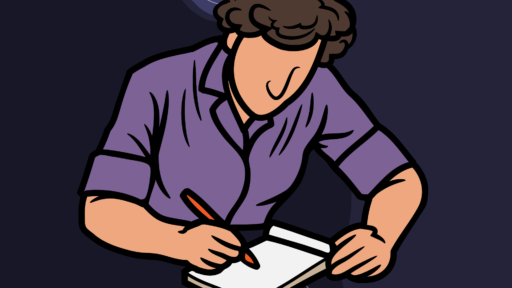It is so hard — maybe even almost impossible
It is so hard — maybe even almost impossible — for me to choose just one single line that I love the most. There are so many lines in so many books that I just absolutely love. And I’m the kind of reader who likes to focus on lines in books. I tend to read a book, stumble on one line, and just get so hooked that I stop reading the book and begin to meditate upon this line for hours and hours and just marvel at the beauty of it.
So I’m going to be writing below just a few of the lines that I love most, because if I choose to write them all for the next twenty four hours I’ll still be writing.
…you must go on, I can’t go on, I’ll go on.
–Samuel Beckett, The Unnamable

Samuel Beckett’s Trilogy is a book that contains in it three novels: the first is “Molloy”; the second is “Malone Dies” and the third is “The Unnameable”. This line is taken from the ending of “The Unnameable” which itself is the end of The Trilogy as a whole.
I remember feeling so much satisfaction at the end of that book, especially because of these lines. Trust me, The Trilogy is not a very happy book, and it’s not supposed to be a kind of book that you read and you feel happy and satisfied afterwards. It’s supposed to leave you feeling confused and confounded, because it’s A VERY shocking book to say the least. But the beauty of these lines lies in the fact that they just make all those terrifying experiences culminate in such a beautiful last line, and the line just sticks with you afterwards.
I remember after I finished reading the book the words kept turning in my head and when I found myself in a really tough situation afterwards they still kept ringing and I found myself saying them to myself, I can’t go on I can’t go on I must go on I’ll go on, so much so that even now when I find myself in any difficult situation I just find the words banging unconsciously in my head over and over!
Everything is fine. God exists. We know time!
– Jack Kerouac, On the Road
I first finished this book about a year ago, but something happened recently that made me go back to it, and I just finished it again — I think for the third time — about two weeks ago. I was glad to find that the magic of the book was still preserved just as it was the first time, especially in these lines. The stillness that I feel whenever I come across a line that just resonates with me was still very much present and you can’t imagine my joy at experiencing that again.
The line itself was spoken by Dean Moriarty, the protagonist of the book, and what is most fascinating about him is how he takes things most seriously by not taking them seriously! His enthusiasm rubs off on me immensely and I was in such a terrible place at the time, where I needed that assurance. And there is nobody that could have given it to me other than Dean Moriarty himself!
You wanted to sublimate a piece of natural human folly into a horror and then exorcize it with truth…
– William Faulkner, The Sound and The Fury
William Faulkner’s delineation of characters is just nothing short of superb! And you can’t find better instances of it than in this passage in “The Sound and The Fury” where Quentin Compson had a heartfelt conversation with his father. It is a highly enriching conversation, and a great lesson on the human heart and motivations and challenges, and I would gladly recommend it for anyone!
After a while I went out and left the hospital and walked back to the hotel in the rain.
– Ernest Hemingway, A Farewell to Arms
So much sadness in so little words. And of course that’s Hemingway, the Iceberg master.
A Farewell to Arms is a novel about a soldier in WWI who finally left the war to be with his wife. The ending is full of so much pathos that it’s hard to get through it without shedding a few tears. What’s most fascinating about this line, however, is the way it unpacks the pathos into simple, seemingly innocuous words. I mean on their own no one would suspect them of meaning just more than a man leaving a hospital and going back to his room.
The fact that they were said in first person, by a man who had just witnessed the most agonizing experience a man can possibly go through, just makes it all the more amazing. And it is exactly from this seeming trivialness that the book packs its terrific punch. And again, this is Hemingway, so no surprise there.
Who knows but that, on the lower frequencies, I speak for you?
— Ralph Ellison, Invisible Man
A lot of interpretations have been given to this line, and to tell you the truth I can’t even figure out exactly what it really means myself. It is the last line in the book and one can choose to consider it as a commentary on the whole story — which is that of alienation. A kind of alienation that is a voluntary response to another violent, more brutal kind, from an intolerant society.
I will choose not to spoil the book for people who haven’t read it, and not speak much about it. And the line itself is just inherently beautiful so it can be very well enjoyed without knowing the full story. One can just simply choose, like me, to regard it as the ending of a love message.
To you, my love, who knows but that, on the lower frequencies, I speak for you.
Also, one of my favorite fiction characters of all time: “Ras the Exhorter” — I loved him so much I stole his name — who later became “Ras the Destroyer”, is in this book.
“I know myself”, he cried, “and that is all.”
– F. Scott Fitzgerald, This Side of Paradise
F. Scott Fitzgerald is probably the best writer in the whole of history. In “This Side of Paradise”— a really underrated novel in my opinion — he wrote this beautiful line. The protagonist, Amory Blaine, spread out his arm, looked at “the crystalline sky” and yelled the words out in a cry of frustration and catharsis.
The cry of a personage who has gone through life with potential, dreams of glory, optimism; who has had his dreams shattered and his potential stultified; who had fallen in love and had his heart ripped out again and again. Who has lost all meaning of life. But who has found amidst all this, something more valuable — himself.
I love to dream of the time when I can say the same.
So we beat on, boats against the current, borne back ceaselessly into the past.
– F. Scott Fitzgerald, The Great Gatsby
This is probably one of the most famous lines in American Literature. Enough has been said about them. Anyone who doesn’t get blown away by them must definitely be checked for a case of Philistinism. As for me I just say, my gad!
And now for the number one entry on the list. The top prize goes to….
You have fallen into art — return to life.
William H. Gass, Willie Masters’ Lonesome Wife
This is weird because I’ve never even read more than an excerpt of this book (or rather a long essay.)
It’s weird, though, because the line is so enchanting that one doesn’t even need to read the book to be arrested by the beauty of it! The threnodic essence of it. It might even be considered a book all in its own right.
It’s the one single line that is capable of having me fixated and sprawled and deep in thought. You have fallen into art! How does one even fall into art!? And isn’t it such a beautiful thing too! And why would I even want to return to life! Life sucks!
But of course William Gass knew we must return. Because in the end art is but a medium; the real essence is life. There really is something so tragically beautiful about this, and when I really allow myself to get into it I find that I can’t help but cry sometimes.
Well there you have it! My favorite lines in literature. I hope you enjoyed them as much as I do.
Cheers.




